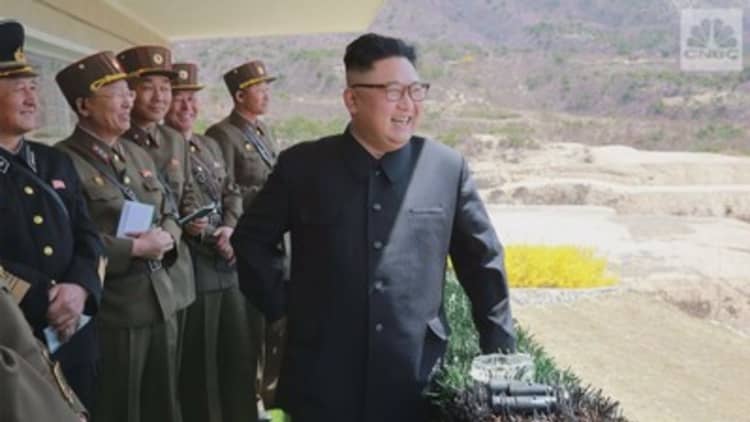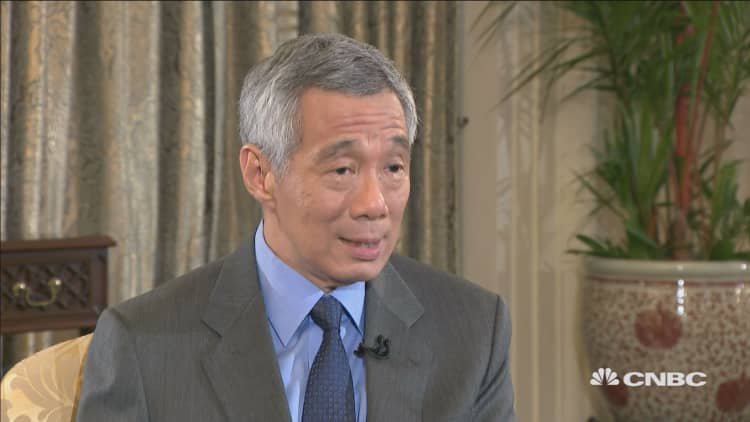
Pyongyang's ongoing nuclear aggression may potentially result in South Korea and Japan hosting nuclear weapons on their own turf, a scenario that would have wide-ranging negative consequences, Singapore's leader has warned.
"What's different this time is that North Korea has more nuclear weapons ... so the risks are higher," Prime Minister Lee Hsien Loong said in an interview with CNBC on Thursday.
To date, North Korean leader Kim Jong Un has conducted six nuclear tests — the latest and largest one on Sept. 3 potentially incorporated a hydrogen bomb and caused a 6.3 magnitude earthquake — in addition to many ballistic missile launches. That's despite ongoing efforts by the international community to bring the sanction-burdened state to the negotiating table.
Tensions recently escalated amid a series of hostile exchanges between President Donald Trump and Kim, with North Korea's deputy United Nations ambassador warning on Monday that "nuclear war may break out any moment." That's left South Korea and Japan — seen as Kim's likeliest targets — weighing various security options, including the deployment of American tactical nuclear weapons in both countries.

"These are thoughts which cannot be completely suppressed and if in fact it goes that way, and South Korea and Japan go closer to being nuclear powers or actually cross the threshold, it means a different strategic and security balance in northeast Asia," Lee said on Thursday.
Not only would that scenario produce more risk and tension, "the Chinese will be very alarmed," he added. "I don't think that will make for a safer world, there will be implications elsewhere in the world."
The current tensions are not just dangerous because of the chance of immediate flare ups, but also because they may introduce "longer-term trends, which are set off in northeast Asia if things persist in this direction," the 65 year-old leader said.
Last month, South Korean Defense Minister Song Young-moo and Secretary of Defense Jim Mattis discussed the prospect of returning American nukes to Asia's fourth-largest economy. Washington stationed nuclear weapons in South Korea in 1958 but withdrew them in 1991. Former Japanese Defense Minister Shigeru Ishiba also suggested placing American nuclear weaponry on Japanese territory last month. Both governments, however, dismissed the idea.
On Trump and TPP
Lee is due to meet with Trump in Washington on Oct. 23, the second encounter between both leaders. During his visit, Lee said he expects to sign an agreement between Singapore Airlines, majority-owned by the government, and Boeing to buy more airplanes, describing it as "a done deal."
The prime ministers also addressed Trump's exit of the Trans-Pacific Partnership pact, which includes Singapore and several Asian economies. The U.S. withdrawal from that deal won't damage the American relationship with the region, he continued.
"It doesn't mean that the existing trade stops, it doesn't mean that investment flows are abandoned," Lee said.
Unlike Tokyo, which is still hoping for Washington's return to the free trade accord, Lee said he doesn't expect the White House to change its mind. "The president has made his position quite clear ... I think we leave it at that, I don't think it's the time yet to start new initiatives multilaterally with the United States. Perhaps one day the time will come."
Developments regarding a new TPP framework without the U.S. may occur by November's Asia-Pacific Economic Cooperation meeting, Lee added.
Here's the full transcript of Prime Minister Lee Hsien Loong's interview with CNBC.
Correction: The headline to this article has been updated to accurately reflect the prime minister's quotation.


